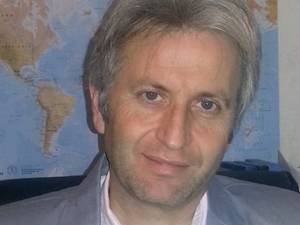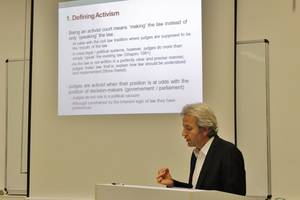

Prof. Dr. Fabien Terpan

Fabien Terpan is Associate Professor at Sciences Po Grenoble, holds a Jean Monnet Chair in EU Law and Politics and is visiting professor at the College of Europe. He is the Deputy Director of the Centre d’Etudes de la Sécurité Internationale et des Coopérations Européennes (CESICE).
Terpan’s research focus lies on the EU’s Common Foreign and Security Policy, international security policy and the interplay between law and politics in the European Union. He teaches courses on European Integration, EU Law and EU Internal and Foreign Policy.
The French researcher is author of a wide range of publications, among them: "The European Court of Justice and the Politics of Law" (to be published in 2016, with Sabine Saurugger), "Resisting new modes of governance: An agency-centred approach" (2015, with Sabine Saurugger), "Soft Law in the European Union – The Changing Nature of EU Law" (2015), "La Cour de justice au cœur de la gouvernance européenne" (2014, with Sabine Saurugger) and "Europe – Etats-Unis: Processus, politiques, projets / Europe – United States : Processes, Policies, Projects" (2013, with Yann Echinard, Albane Geslin and Michel Gueldry).
Course: "The Politics of Law in the European Union"
Fabien Terpan holds the THESEUS Visiting Professorship at the University of Cologne for the Winter Term 2015/16. In his class "The Politics of Law in the European Union", the scientist will discuss the link between law and politics in the European Union. His course is split in two parts, dealing first with soft law in the EU and afterwards with the role of the European Court of Justice. Together with his students, Terpan wants to contrast those scientists claiming that intergovernmental mechanisms prevail more and more to those who argue in favour of continued judicialization of the EU.
THESEUS Interview with Prof Fabien Terpan
Inaugural lecture: "Is the ECJ an Activist Court? Studying the Court’s Power from a ‘Law and Politics’ Perspective"
"Is the ECJ an Activist Court?" This question analyses THESEUS Visiting Professor Fabien Terpan, Sciences Po Grenoble, in his scientific work. On 28 October 2015, he shared his reflections with an interested audience of students and young researchers in Cologne.

"The European Court of Justice (ECJ) is a very dynamic court whose influence has clearly increased within the last decades despite national and international constraints", stated THESEUS Visiting Professor Fabien Terpan, Sciences Po Grenoble, at his inaugural lecture on 28 October 2015 at the University of Cologne. His speech was a profound depiction of a current study, which he pursues with his research colleague and former THESEUS visiting professor Sabine Saurugger, Sciences Po Grenoble.
Terpan started by giving an overview of the development of research on the ECJ over the last years, showing that it has first been mainly studied by lawyers before political scientists came in and declared the court as a clear political actor. He then raised the fundamental question, which explains his research interest: "Is the ECJ and Activist Court?" In his opinion, it has not been sufficiently answered yet.
To answer the question, Terpan has defined 'activism', considered the most important approaches for analysing the court and measured its role along different categories of legal interpretations such as teleological, functional, consequentialist, systemic, literal and historical. "Our results show that the Court is still an activist; this is present in a considerable number of rulings, even in the most recent periods", said Terpan, who has investigated the years between 1980 and 2011, divided in four time periods. "However, the proportion of activist rulings has decreased in the early 2000s, showing that the Court has restrained itself in the years following the Maastricht treaty."
In further research steps, Terpan wants to link his findings to the strategic positioning of the ECJ: Why have its judges acted in the way they did? He also plans to consider relations to actions taken by other supranational institutions, national courts or interest groups.
Following Terpan’s speech, the audience engaged in a lively and debate. The questions addressed a wide range of aspects – from research design to general legitimacy of the ECJ and national federal courts – leaving everyone with new insights and ideas for possible future research questions.
The evening was opened and moderated by Prof Wolfgang Wessels, University of Cologne, and Mirja Schröder, THESEUS Project Manager at the University of Cologne. It was followed by a reception, which gave room for informal follow-up talks.